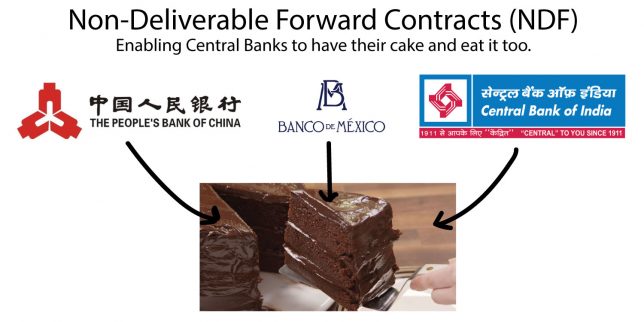My full notes and analysis on the Wall Street Journal from the past week: March 6-12, 2017 (Week 10). Please Enjoy.
Central Banks & NDF Contracts: Have your cake and eat it too!
‘Shore up your currency, No money down!’ It sounds like a bad late night television ad. It’s also what many central banks around the world have been doing very actively in recent years.
Traditionally central banks will buy and sell foreign currency to manage the strength of their currencies. This process leads to large fluctuations in foreign exchange reserves. But it appears that many central banks have started to rely heavily upon Non-Deliverable Forward (NDF) contracts. NDFs provide central bankers a way to both keep their foreign currency reserves and manage inflationary and deflationary pressure. Additionally, NDFs suppress foreign exchange volatility, and even allow central banks to increase reserves.
But these benefits are largely illusory. Foreign exchange volatility isn’t lower, rather NDFs have simply removed it from the central bank’s books. In this way, NDFs are not much different than Credit Default Swaps used by banks before the financial crisis, or Special Purpose Vehicles used by Enron to manipulate its balance sheet.
You could say that NDF contracts have allowed Central Banks to have their cake and eat it too. China, Mexico, and India are all indulging in this cake-eating-and-holding paradox.
At the moment, NDFs appear to be effective when used in stable markets, but during times of stress, the complexion of these derivatives will almost certainly change. So the more the central banks rely on NDFs, the more pain will be felt in periods of turmoil.
P.S. I would love to find information regarding the size and growth of non-deliverable forward currency contracts (NDF). But it’s hard to get.
China
Since the financial Crisis, The People’s Bank of China has significantly increased their reliance on NDF’s.
“The People’s Bank of China has been using derivatives to prop up the yuan without actually spending its stash of dollars.” (link)
“The derivatives, however, make the picture look rosier than it really is.”
“Derivative interventions are considered quite unorthodox despite having a long history. One of the pioneers was the Bank of France, which in 1927 famously resorted to buying sterling in forward markets because it wanted to quell inflows into the franc without having to issue more notes. It wasn’t very successful back then, and results have remained mixed ever since.”
Feb 17 2015: “the average daily trading volume across all NDF currency markets has grown from about $20 billion to $60 billion over last five years. The rise in activity in NDF markets is particularly noticeable for the rupee, the Brazilian real and the Chinese yuan. These economies are becoming increasingly important in the global trade.” (link)
Mexico: A Dollar-Hedgeing Program Is Started
“The Bank of Mexico launched a dollar-hedging program placing all $1 billion in forward contracts as it opens a new front in efforts to support the peso without draining foreign reserves.”…”The nondeliverable forwards are settled in pesos.” (link)
“The use of derivatives gives the central bank ammunition to support the peso without selling dollars from its foreign reserves, as it has done in recent years.”
India: Reserve Bank steps in to rein in runaway rupee
“Besides traditional dollar buying from the domestic spot market, there was a tweak in the intervention strategy, dealers said.” (link)
“State-owned banks made ‘sellbuy’ derivative deals, converting spot dollar buying transactions into forward deals, dealers said, deferring delivery of dollars through such forwards deals. Banks sell dollars they bought in the spot market and then they buy the same unit in the next leg as a forward transaction, keeping the net position at ‘buy’.”
“‘The approach is aimed at limiting rupee liquidity in the system,’ said the head currency dealer of a mid-size bank.”
ZTE Warning Label: Official Sponsor of North Korea
Last week, Chinese telecom company ZTE plead guilty to supplying North Korea and Iran with telecommunications equipment over a six year period. They orchestrated an elaborate system to circumvent U.S. sanctions and supply these countries with U.S. technology. For its actions, ZTE was fined $892 million. (link)
But I don’t think a fine is enough. ZTE is the #4 maker of smart phones, by volume, in the U.S. As a consumer products company, I think U.S. citizens should be warned that ZTE illegally circumvented U.S. policies and sponsored the governments of North Korea and Iran.
So I propose adhering a warning sticker to all of their consumer products. Much like you’d find on a pack of cigarettes. I imagine it would look something like this.
They couldn’t give those phones away. And it would serve as a very high-profile warning to all other companies.
The Inhaler Checklist
When looking to avoid catastrophic mistakes, checklists have be proven to be extraordinarily effective. Whether in hospitals, airplanes, or investing. Another application: Inhalers.
“Studies have found that patients make at least one mistake as much as 70% to 90% of the time. The result: only about 7% to 40% of drugs is delivered to the lungs.”
“Coordination was the biggest and most series error…Even half a second late in inhaling and you press the inhaler too soon you get only 20% of the medication.”
Problems:
- Coordination: Holding breath at the proper moment
- Forgetting to shake the inhaler.
- Exhaling too quickly
Investment Lesson:
Use checklists: They have the universally accepted benefit of helping us avoid catastrophic decisions or actions.
Trump’s stock market rally: It’s not how you start. It’s how you finish.
Interesting history on stock market performance over Presidential terms. (link)
“Other presidents had misleading starts. Herbert Hoover presided over a nearly 44% total return in his first 10 months for the predecessor of the S&P 500. But the index dropped 31% on an annualized basis during his entire four years in office. Unsurprisingly he wasn’t re-elected.”
Barriers to Entry: Lobbying & Political Self-Interest
Lobbying & Political Self-Interest make it very challenging to enter or disrupt some industries. When threatened by a new entrant, old corporate hegemons will use their vast lobbying resources to prevent upstart competitors from displacing them.
Meanwhile, self-interested politicians will be motivated to fight on behalf of the old hegemons who supply their state with massive employment and tax revenue.
Here are some examples from this past week.
Self-Driving Tech Companies vs. GM (link):
“After falling behind in self-driving cars, GM has unleashed its powerful lobbying team to cultivate relationships with statehouses. The largest U.S. vehicle maker by sales has a long history of backing legislation to preserve its interests, including a bill in Indiana last year that would stop electric-vehicle maker Tesla Inc. from operating its own stores there.”
Airbnb vs. The Hotel Industry (link):
“The hotel industry has been at the forefront of lobbying for stricter regulations on Airbnb that it says are needed to put the service on a level playing field with traditional hotels.”
Avoid “National Champions”
Avoid direct competition with companies which are national champions of socialist and communist countries. Specifically in industries which sell commoditized products; i.e. China & Steel. These companies will likely have a lower cost of capital than you and make your life a nightmare.
GM recently exited Europe with its sale of Opel. Among the problems they faced in Europe was the existence of car companies labeled as “national champions” who received support from their respective governments.
Mary Barra, GM’s CEO, addressed these issues in a statement:
“Our overall philosophy is every country, every market segment has to earn its cost of capital, has to be contributing.” (link)
“Europe, which has always been cutthroat due to a glut of capacity and national interests in auto makers, became even more difficult from political, regulatory, and consumer-preference standpoints in recent years,”
Carlos Ghosn, Nisan’s CEO, talked about Renault being treated as a national champion.
” Mr. Ghosn, speaking in an interview Thursday, said a merger is off the table as long as French officials see Renault as a national champion, with interests that are separate from the Japanese partners. “Nissan has been very clear during discussions with the French state that they are not going further in terms of a merger, or anything else, with the French state as a shareholder of Renault.”” (link)
Market Developments
Multi-year Highs and Lows
There were lots of multi-year highs and lows occurring last week.
“The U.S. posted its biggest monthly trade deficit in nearly five years in January,”
“The downtown Miami market is expected to see the most new condos delivered this year since 2008, roughly 3,500 units in all,”…”at the peak, developers could finance up to 75% of the cost to build a project, not that is down to 50%.” (link)
“This week marks the bull market‘s eight-year anniversary, the second-longest on record. Since the March 2009 bottom, the S&P 500 has surged more than 300% including dividends.” (link
“65,500 metric tons of copper flowed into exchange-approved warehouses Monday and Tuesday, a surge of 33%, the biggest two-day rise in 20 years,” (link)
“The price-to-earnings ratio of the S&P 500 based on analyst forecasts for the next year is near 17.7, the highest since 2004,”
“There were a total of 279 insider buyers in January, the lowest number going back to 1988,” (link)
“Short positions across stocks, exchange traded funds and equity futures last week fell to near their lowest levels in 10 years,” (link)
The yield on the two-year note, closed at 1.329%. That was the highest since June 2009.” (link)
“In 2017, with global equity funds posting record net inflows in the week ended March 1 based on data going back to 2000,” (link)
Effect of Proposed House Tax Plan
“Under the House (tax) plan, Goldman figures it would drop (corporate taxes) to 24%, boosting after-tax earnings by about 10%…The market currently trades at about 18 times analysts’ expected earnings for 2016,…Raise earnings by 10% and that price/earnings ratio slips to a more reasonable but still expensive 16.4.” (link)
Central Banks Ratchet Up Reserves (link)
“Central banks around the world are increasing foreign-currency reserves, highlighting the fragile underpinnings of the global economic recovery despite a bullish mood in financial markets.
“Two-thirds of the 30 biggest emerging markets increased reserves last year,”
“Switzerland’s holdings of foreign assets jumped last month at their fastest pace in more than two years,”
“In January, Russia added $13 billion to its $390.6 billion in reserves, its largest monthly increase in more than four years.“
“In Europe, big increases in reserves are often associated with periods of global stress….External reserves are a form of insurance for sovereigns against crisis and defaults,”
China News
There were lots of fascinating news stories regarding China developments over the past week:
China’s Steel Cuts Aren’t as Deep as They Appear (link)
China cut steel capacity by 10.5% last year. But it was practically meaningless as most of it was long-since idled. Furthermore, despite the capacity reductions, steel production rose 1.2%.
“Chinese mills make half the world’s steel but depend on state subsidies and bailout mergers to survive.”
“From 2011 to 2015, global steel prices fell 70% as Chinese companies flooded the market with cheap steel.”
Beijing Tightens Grip on Internet Portals (link)
China’s theme for this year is “stability”. That means cracking down on internet-based political commentaries. Is this a signal of coming instability?
“Ending practices that skirt regulations fits with the ever tightening control the government has exerted on the internet since President Xi Jinping rose to power in late 2012. Targeting outright political dissent has expanded to include critical commentaries.”
“Any company whose service could potentially trigger social unrest should brace itself for more regulation-or at least greater scrutiny, industry insiders say.”
Chinese Lenders Tap the Brakes (link)
How can an economy be so herky-jerky? One month they have near record lending, the next they slam on the brakes, and so on.
“Chinese banks sharply scaled back lending last month, after a near-record tally in January, as Beijing tries to strike a balance between boosting economic growth and containing financial risks.”
U.S. TV Foray Ends for China’s Wanda (link):
There have been several Chinese deals halted suddenly since the Trump election. Here’s another one.
“Dalian Wanda Group’s $1 billion deal to buy Dick Clark Productions Inc. is dead…Beijing’s scrutiny of overseas investments, stemming from fear that too much capital flight could weaken the yuan, also killed takeover talks between several Chinese companies and Metro-Goldwyn-Mayer Studios late last year.”
China Logs Rare Trade Gap (link)
“China recorded its first trade deficit in three years last month, driven by higher commodity prices, an unexpected drop in exports, and the effect of the Lunar New Year holiday.”
Beijing’s Numbers Are Difficult to Reconcile (link)
“Tuesday brought a surprise increase in foreign-exchange reserves. Wednesday, it was an unexpected trade deficit – China’s first in three years – which made the rise in Beijing’s currency hoard even harder to account for.”
“A trade deficit ought to put additional pressure on the People’s Bank of China to support the yuan, by selling down its foreign-currency reserves-but the evidence shows the central bank spent less on defending the yuan last month than in the recent past.”
The Economic Costs of Ideology
Several articles address the economic costs of ideological polices. I found it rather fascinating how economics and ideology interplay in shaping legislation.
- Legislative Hearing Held on Bathroom Bill: “Major players in Texas’ business community have also argued the bill will hamper their ability to draw workers and investment.” (link)
- Ivanka Trump’s Billionaire Landlord: The proposed mine is opposed by environmental groups and by Minnesota Gov. Mark Dayton, a Democrat. It is supported by Minnesota officials of both parties who cite potential job creation. S. Rep. Rick Nolan, a Democrat who represents the area, in a news release attacked the lease decision as “anti-mining, anti-jobs“ and urged Mr. Trump’s administration to overturn a related move by Mr. Obama’s administration to place a 20-year moratorium on mining in the area.” (link)
- Hawaii’s Lawsuit On Travel Order Set for a Hearing: “The state says the travel restrictions are a blow to tourism, to in-state employers who need foreign workers…” (link)
“Forecasting” Oil Prices
In January bullish oil bets hit a 10 year high. Two months later U.S. inventory levels his a record and oil prices rapidly sunk. This shows the difficulty of forecasting such things and the euphoria and panic that can grip market participants.
January 31, 2017: Bullish Oil Bets Climb to Record (link): ” Long positions exceeded shorts by such a degree that it’s the largest net bullish position in 10 years of data from the CFTC.”
March 9, 2017: Crude Logs Biggest Drop in Over a Year (link): “Oil prices suffered their biggest one-day plunge in more than a year after U.S. crude stockpiles hit record levels, raising concerns that even after recent production cuts, the world remains awash in oil.”…”US. inventory levels have risen for nine weeks in a row. They hit a record of 528.4 million barrels last week as imports and U.S. production increased.”
March 10, 2017 (link): U.S. crude fell below $50 a barrel for the first time this year, in the biggest two-day sell-off since June.
“Forecasts may tell you a great deal about the forecaster; they tell you nothing about the future.” – Warren Buffett
Quote of the Week:
“Borrowers were more likely to receive aid if they threatened to go to the media with their complaints, one former employee said.” (link)





